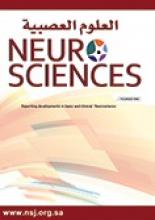Abstract
OBJECTIVE: To determine whether IgG from amyotrophic lateral sclerosis (ALS) patients could cause activation of microglia, proliferation of astrocytes, and infiltration by lymphocytes within mice spinal cords.
METHODS: A group of 5 mice received injections of IgG purified from sera of patients with ALS. A control group of 5 mice received IgG from healthy humans, whilst a third group of 2 mice served as non-injected controls. One mouse served as a positive control and was injected with lipopolysaccharide, a known activator of microglia. Mice were culled after one week, for immunocytochemistry of spinal cord sections to localize the complement receptor CD11b on activated microglia, glial fibrillary acidic protein on astrocytes, and CD4 and CD8 receptors on lymphocytes. Histological examination was used to determine the presence of inflammatory reaction. This work was conducted at the Institute of Neurology, Queen Square London, United Kingdom, from January to July 2004.
RESULTS: There was no significant difference in activation of microglia between mice injected with ALS IgG and mice injected with control IgG (p = 0.631), although mice injected with ALS IgG exhibited greater microglial activation than non-injected mice (p = 0.044). Proliferation of astrocytes was not significantly different between the 3 groups. CD4 and CD8 lymphocytes were both absent in mice injected with ALS IgG, mice injected with control IgG and non-injected mice.
CONCLUSION: Activation of microglia following passive transfer of IgG from ALS patients to mice represents a non-specific inflammatory response, rather than a primary mechanism for motor neuron degeneration.
- Copyright: © Neurosciences
Neurosciences is an Open Access journal and articles published are distributed under the terms of the Creative Commons Attribution-NonCommercial License (CC BY-NC). Readers may copy, distribute, and display the work for non-commercial purposes with the proper citation of the original work.






